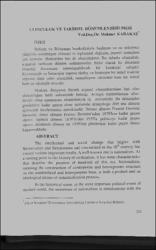| dc.contributor.author | Karakaş, Mehmet | |
| dc.date.accessioned | 2015-03-10T11:30:50Z | |
| dc.date.available | 2015-03-10T11:30:50Z | |
| dc.date.issued | 1999 | |
| dc.identifier.issn | 1302-2407 | |
| dc.identifier.uri | http://hdl.handle.net/11630/2598 | |
| dc.description.abstract | Reform ve Rönesans hareketleriyle başlayan ve on sekizinci yüzyılda somutlaşan zihinsel ve toplumsal değişim, önemli sonuçlara yol açmıştır. Bunlardan biri de ulusçuluktur. Bu itibarla ulusçuluk, uygarlık tarihinin dönüm noktalarından birisi olarak bu dönemin insanlık durumunu tanımlayabilecek bir karaktere sahiptir. Kozmopolit ve heterojen yapının türdeş ve homojen bir temel üzerine inşasını ifade eden ulusçuluk, sanayileşme sürecinin hem bir ürünü hem de ideolojik aracıdır.
Modem dünyanın önemli siyasal oluşumlarından biri olan ulusçuluğun tarih sahnesinde belirişi, Avrupa toplumlarının ulus- devlet olma aşamasına ulaşmalarıyla eş zamanlıdır. Bu dönemden günümüze kadar geçen süreç içerisinde ulusçuluğu dört ana dönem içerisinde incelememiz mümkündür. Birinci dönem Fransız Devrimi öncesini, ikinci dönem Fransız Devrimi'nden 1870'lere kadar geçen süreci, üçüncü dönem 1870'lerden 1939’a gelinceye kadar geçen süreci, dördüncü dönem ise 1939'dan günümüze kadar geçen süreci kapsamaktadır. | en_US |
| dc.description.abstract | The intellectual and social change that begins with Reformation and Renaissance and concretized in the 18th century has caused various important results. A well-known one is nationalism. As a turning point in the histoıy of civilisation, it has some characteristics that describe the position of mankind of this era. Nationalism, meaning the construction of cosmopolite and heteregenous structure on the standardized and homogeneous base, is both a product and an ideological means of industrialization process.
In the historical scene, as the most important political event of modern world, the occurence of nationalism is simultaneous with the period that European societies has evolved to nation-states. In this period it is possible toexamine the development of ııationalism in four main historical phases: the first one continues to the French Revolution; the second begins vvith French Revolution and ends in 1870s; the third one is between 1870 and 1939; and the last one starts in 1939 and continues up to now. | en_US |
| dc.language.iso | tur | en_US |
| dc.publisher | Afyon Kocatepe Üniversitesi | en_US |
| dc.rights | info:eu-repo/semantics/openAccess | en_US |
| dc.subject | Ulusçuluk | en_US |
| dc.subject | Sanayileşme | en_US |
| dc.title | Ulusçuluk ve Tarihsel Dönemlendirilmesi | en_US |
| dc.type | article | en_US |
| dc.relation.journal | Sosyal Bilimler Dergisi | en_US |
| dc.department | Afyon Kocatepe Üniversitesi, Fen Edebiyat Fakültesi Sosyoloji Bölümü | en_US |
| dc.identifier.volume | 1 | en_US |
| dc.identifier.startpage | 283 | en_US |
| dc.identifier.endpage | 304 | en_US |
| dc.identifier.issue | 1 | en_US |
| dc.relation.publicationcategory | Makale - Uluslararası Hakemli Dergi - Kurum Yayını | en_US |



















